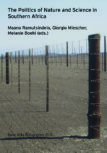The Politics of Nature and Science in Southern Africa
- Language: English
- 2016
- 343 pages
- Illustrations, maps, tables, index
- ISBN 978-3-905758-77-1
- eISBN 978-3-905758-87-0
The Politics of Nature and Science in Southern Africa
This book brings together recent and ongoing empirical studies to examine two relational kinds of politics, namely, the politics of nature, i.e. how nature conservation projects are sites on which power relations play out, and the politics of the scientific study of nature. These are discussed in their historical and present contexts, and at specific sites on which particular human-environment relations are forged or contested. This spatio-temporal juxtaposition is lacking in current research on political ecology while the politics of science appears marginal to critical scholarship on social nature. Specifically, the book examines power relations in nature-related activities, demonstrates conditions under which nature and science are politicised, and also accounts for political interests and struggles over nature in its various forms.
The ecological, socio-political and economic dimensions of nature cannot be ignored when dealing with present-day environmental issues. Nature conservation regulations are concerned with the management of flora and fauna as much as with humans. Various chapters in the book pay attention to the ways in which nature, science and politics are interrelated and also co-constitutive of each other. They highlight that power relations are naturalised through science and science-related institutions and projects such as museums, botanical gardens, wetlands, parks and nature reserves.
Maano Ramutsindela, Professor of Environmental & Geographical Science at the University of Cape Town, South Africa.
Giorgio Miescher, Lehr- und Forschungsstelle Namibian and Southern African Studies, Centre for African Studies, University of Basel.
Melanie Boehi, history PhD student at the Basel Graduate School of History and Centre for African Studies Basel, University of Basel.
Part I – Reflections on the Politics of Nature and Science
1 Introductory notes on the politics of nature and science
Maano Ramutsindela, Giorgio Miescher, Melanie Boehi and Tanja Hammel
2 Political dynamics of human-environment relations
Maano Ramutsindela
Part II – Institutionalised Scientific Power
3 Racial difference in Mary Elizabeth Barber’s knowledge on insects
Tanja Hammel
4 Hamburg’s Botanical Museum and German colonialism: nature in the hands of science, commerce and political power
Gabriele Kranz
5 Circulating nature: from north-eastern Namibia to South Africa and back, 1960–1990
Luregn Lenggenhager
6 Rehabilitating the ‘Ovambo cattle’: veterinary science and cattle breeding in early colonial Namibia
Giorgio Miescher and Anna Voegeli
Part III – Plants and Power
7 Medicinal plants in South Africa
Diana Gibson
8 “Flowers are South Africa’s silent ambassadors”: flower shows and botanical diplomacy in South Africa
Melanie Boehi
Part IV – Impoverished Environmentalism
9 The comprehensive hunting ban: strengthening the state through participatory conservation in contemporary Botswana
Annette LaRocco
10 Land relations and property rights in central-north Namibia’s communal areas
Romie Vonkie Nghitevelekwa
11 Local community disempowerment at the (trans)frontier
Ndidzulafhi Innocent Sinthumule
12 On identities, ways of knowing and interactions across difference in collaborative urban nature conservation at Macassar dunes, Cape Town
Marnie Graham
13 Fragile ground, contested soil: dynamics of tenure and policy in the Bamenda wetlands
Sandro Simon
Part V – Interventions
14 Hidden struggles in conservation: people’s resistance in Southern Africa
Frank Matose
15 ‘Before we start’: science and power in the constitution of Africa
Elísio Macamo

